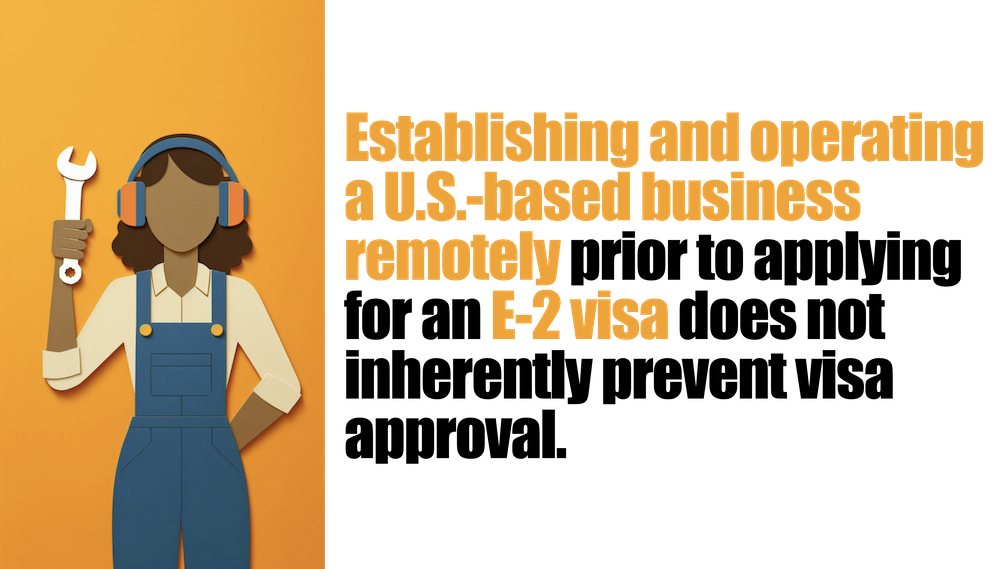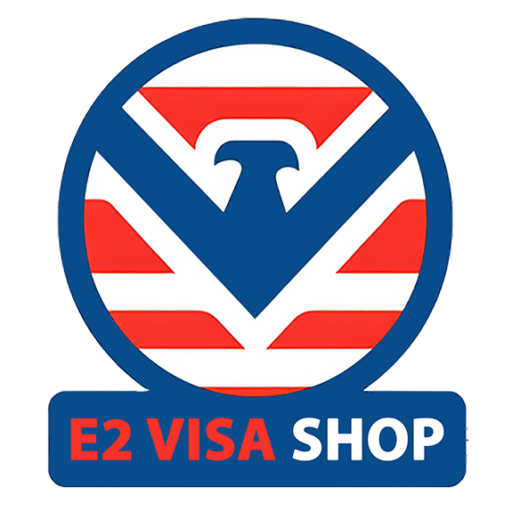
Author: E2 VISA SHOP
Date: February 24, 2025
Abstract
This article examines the implications of establishing and operating a U.S.-based business remotely from abroad prior to applying for an E-2 Treaty Investor visa. Drawing on U.S. immigration law principles and Department of State guidelines, it evaluates whether such a strategy affects visa approval outcomes. The analysis suggests that remote operation does not inherently disqualify an applicant, but the necessity of the investor’s physical presence and role in the business must be substantiated.
Introduction
The E-2 visa is designed to allow nationals of treaty countries to enter the United States to develop and direct the operations of an enterprise in which they have invested, or are actively in the process of investing, a substantial amount of capital. One frequently asked question among prospective applicants is whether launching a business in the U.S. while residing abroad—operating it remotely and generating profits—would negatively impact an eventual E-2 visa application. This paper investigates the legal framework and practical considerations that influence such a case.
Legal Framework and E-2 Eligibility Criteria
To qualify for an E-2 visa under U.S. immigration law (INA §101(a)(15)(E)), applicants must meet several core criteria:
- The investor must be a national of a treaty country.
- The investment must be substantial.
- The enterprise must be a real and operating commercial entity.
- The investment must not be marginal.
- The investor must be coming to the U.S. to develop and direct the enterprise.
(U.S. Department of State, 2024)
The last requirement—developing and directing the business—places emphasis not only on financial investment but also on the investor’s ongoing, hands-on involvement.
Remote Operation and E-2 Visa Concerns
Operating a U.S. business remotely from outside the country is increasingly common in today’s digital economy. However, this raises concerns regarding the necessity of the investor’s physical presence in the United States. A consular officer evaluating the visa application may question whether the applicant is truly needed in the U.S. to direct the enterprise if it has already proven to be operational and profitable without their on-site involvement.
According to the U.S. Foreign Affairs Manual (FAM 9 FAM 402.9-6), the applicant must demonstrate a “develop and direct” role, which implies substantial control and oversight. While remote management does not automatically disqualify an applicant, it necessitates a compelling explanation of why the investor’s physical presence is required moving forward.
Strategic Considerations for Applicants
Applicants planning to operate a business remotely prior to seeking an E-2 visa should be aware of several strategic considerations:
1. Establish Proof of Substantial Investment
Even when operated from abroad, the business must show that a substantial and irrevocable investment has been made. This includes formation documents, equipment purchases, lease agreements, payroll records, and other indicators of economic commitment.
2. Demonstrate Active Involvement
The investor should document their role in the decision-making processes and management of the business, even if done remotely. This includes emails, operational manuals, business strategies, and team management protocols.
3. Justify the Need for U.S. Presence
The application must present a credible narrative explaining why the next stage of business development requires the investor’s physical presence. Examples may include scaling operations, opening additional locations, expanding the workforce, or securing critical partnerships.
Case Precedents and Anecdotal Evidence
Though no formal case law exists regarding this specific scenario, anecdotal evidence from immigration consultants and prior E-2 applicants indicates that consular officers have approved applications where the investor:
- Initially launched the business from abroad.
- Provided strong financial and operational documentation.
- Articulated a clear expansion plan necessitating U.S.-based leadership.
Conclusion
Establishing and operating a U.S.-based business remotely prior to applying for an E-2 visa does not inherently prevent visa approval. However, it introduces a greater burden of proof concerning the necessity of the investor’s physical presence in the United States. By proactively addressing these concerns through careful documentation and strategic planning, applicants can present a compelling case aligned with the legal intent of the E-2 visa program.
References
U.S. Department of State. (2024). Foreign Affairs Manual – 9 FAM 402.9-6 E Visa Classification. Retrieved from https://fam.state.gov
U.S. Citizenship and Immigration Services (USCIS). (2024). E-2 Treaty Investors. Retrieved from https://www.uscis.gov/e-2
Code of Federal Regulations. (2024). 8 CFR § 214.2(e) – Treaty Traders and Investors.
